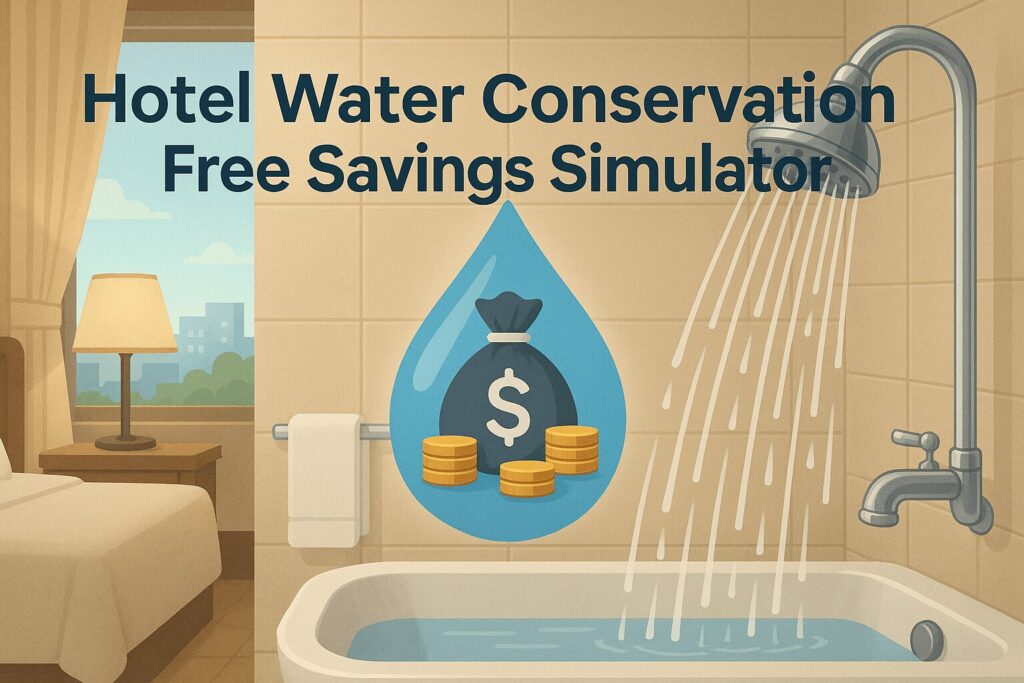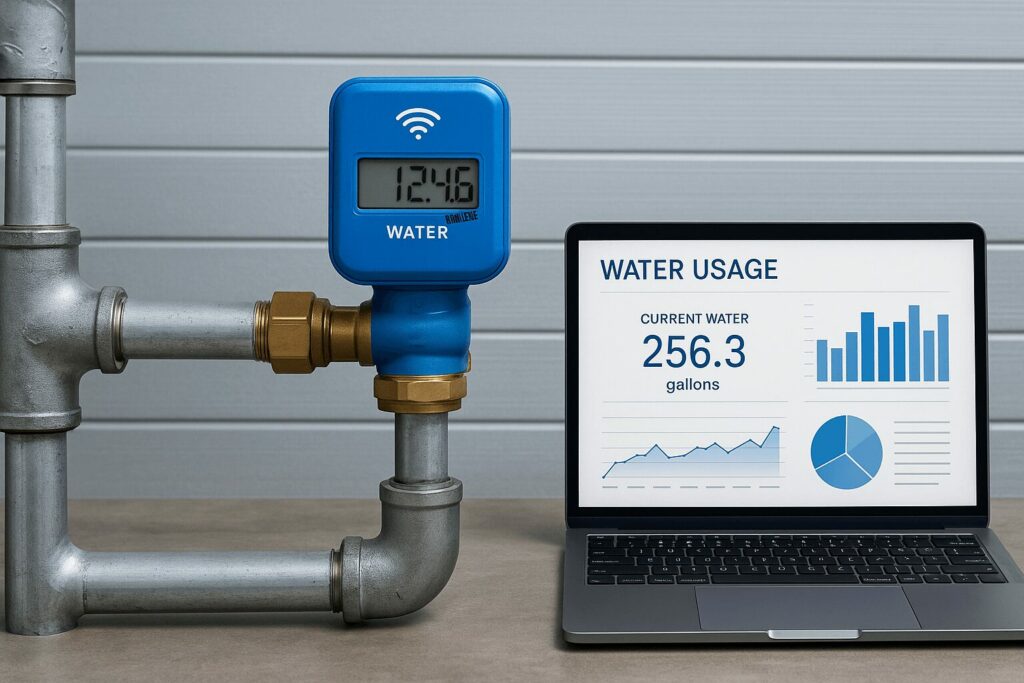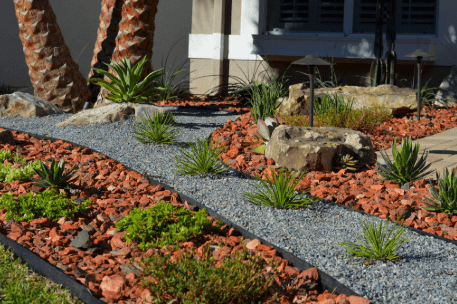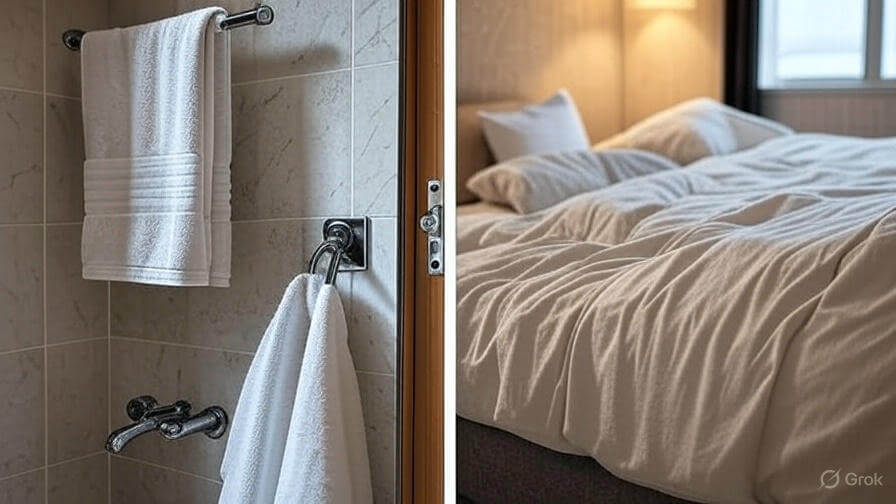
Water Conservation in Hotel Industry: An Overlooked Opportunity
Hotel Water Conservation Measures Simulator User Guide
Try out our hotel water conservation implementations simulator! Enter your hotel’s current water consumption data in the table on the left. You will receive an estimate of your current hotel’s water consumption and its associated cost. By adjusting the parameters in the table on the right, you can simulate the potential impact of various potential water conservation implementations.
💧 Hotel Water Consumption Comparison
CURRENT SITUATION
CURRENT WATER CONSUMPTION
WATER SAVINGS IMPLEMENTATIONS
WATER CONSUMPTION AFTER SAVINGS IMPLEMENTATIONS
Cut hotel water use: save costs and the planet 🌊
Ever wondered if your hotel could improve its daily water use? 🌊 Despite a cheap cost per cubic meter, every drop counts! Hotel water conservation isn’t just eco-friendly—it’s a lifeline for cutting costs and meeting modern travelers’ expectations. This article dives into proven strategies—from low-flow fixtures to guest engagement tricks—that slash waste, boost sustainability, and keep your bottom line healthy. And, as a cherry on the cake, we put at your disposal a free water savings simulator. Let’s turn the tide on water misuse together. 🌱
Table of contents
- Top 10 Hotel Water Conservation Measures 📊
- Why Water Conservation Matters in the Hospitality Industry 🌊
- Financial and Environmental Benefits of Hotel Water Conservation 💚
- Effective Water Conservation Strategies for Hotels 💧

Top 10 Hotel Water Conservation Measures
1 / Implement Leak Detection Process
Conducting daily or even twice-daily water consumption meter controls allows for the early detection of potential leaks and enables a prompt response to address them. A close water consumption monitoring is the key to analyze and, ultimately, optimize water use.
2 / Leverage the Latest Water Monitoring Technologies
Certain technological advancements—such as smart meters and leak detection systems using flow sensors and probes—can help you identify potential water leaks almost instantly. By alerting you immediately in case of excessive consumption, these systems enable swift repairs, allowing you to save water and protect the integrity of your buildings.
3 / Switch to Water-Efficient Equipment
With a medium-term perspective, replacing equipment such as washing machines, cooling towers, or dishwashers with water-efficient models will reduce daily water consumption. This investment will pay off in the long run while adding a sustainable dimension to your operations.
4 / Switch to Low-Flow Fixtures
This is likely the most effective way to reduce water consumption in your hotel. Replacing regular showerheads with low-flow showerheads, installing faucet with aerators filters and switch to double flush toilets can reduce your hotel’s overall water usage by up to 25%.
5 / Implement Towel and Linen Reuse Program in Guest Rooms
By avoiding the daily replacement of guest linens and towels—or by offering it upon request—you can significantly reduce both water and energy consumption related to laundry operations.
6 / Educate Your Staff on Water Conservation
Staff education is a key driver of water consumption reduction. Through training, you can help your employees use water more efficiently and quickly identify any irregularities in water usage.
7 / Incentive Your Eco Conscious Guests
By engaging your guests in your water reduction efforts, you can achieve meaningful results while creating valuable communication around your sustainability initiatives. An increasing number of hotels are offering discounts or complimentary services to guests who make the effort to reduce their water usage.
8 / Go for Xeriscaping
Xeriscaping is a landscaping approach that prioritizes the use of native plants adapted to the climate of your hotel’s location. These species are naturally suited to local conditions, making them more resilient and less water-intensive.
9 / Harvest Rainwater
Rainwater harvesting enables significant reductions in water consumption. It requires investment in equipment and modifications to your facilities to reuse rainwater for applications such as toilet flushing or cooling towers. Beyond the operational benefits, it sends a strong signal of commitment to sustainability.
10 / Recycle Greywater
Greywater is wastewater from showers and sinks that typically goes directly to the sewer. By adapting your sewage system, you can treat and reuse this water for non-potable purposes such as toilet flushing or irrigation. The potential water savings are substantial, allowing you to effectively use the same water twice

Why Water Conservation Matters in the Hospitality Industry 🌊
In Europe, Hotels use nearly 300 liters of water per guest daily, while big resorts in Carribean, Middle East or Asia consume over 800 liters per guest per night. This waste strains ecosystems and budgets. A graph available on Researchgate highlight massive differences. It highlights that, over than particular location needs, a significant effort must be done to reach hospitality sustainability goals. 🌍 Considering a bigger scale, Las Vegas Water Conservation Implementations show amazing results, showing how impactful a global vision on this matter is.
Commercial buildings see 19% of water use from hotels, far exceeding residential rates. Guests use double household water levels, yet 30% reductions are achievable through efficient fixtures and leak detection. High consumption in showers, toilets, and landscaping highlights urgent action needs. Protecting freshwater resources isn’t just eco-friendly—it’s business-smart. 💧
Financial and Environmental Benefits of Hotel Water Conservation 💚
Hotels slash water costs by 20-40% with efficient fixtures and leak fixes. In Texas, some hotels took part of an experimental program, allowing them to saves, in average, $35k yearly by upgrading toilets and faucets. In average, the ROI on this type of conservation fixtures takes 3 to 7 years—cash flow stays healthy while ecosystems thank you. 💸 Benefits to tackle water saving topic are multiple. Generally, hotels and resort operators and owners could notice the following positive impacts by doing so:
- Reduced water consumption through efficient fixtures like low-flow showerheads and faucets
- Lower energy use by decreasing hot water heating needs
- Preserved freshwater ecosystems and local wildlife habitats
- Boosted sustainability efforts via eco-friendly laundry and cleaning systems
- Minimized chemical runoff by optimizing irrigation and wastewater practices
Also, keep in mind that travelers now rate eco-conscious hotels 20% higher, when simple fixes like low-flow showers cut water use by up to 40% in guest rooms. Clients notice—and reward—hotels that prioritize sustainability, while you are saving money. Therefore, Green practices aren’t just trendy; they’re double profit-friendly. 🌿
Effective Water Conservation Strategies for Hotels 💧
Technical Solutions and Infrastructure Upgrades
Water conservation implementations could allow massive savings in terms of consumption. As examples, Water-efficient fixtures slash hotel usage by 30-60%. Low-flow showerheads can cut flow up to 5 liters per minute while maintaining pressure. Greywater systems like Hydraloop recycle 45% of shower water for toilets. Smart meters track usage in real time. 🚰 Out of the well-know solutions such as low flow fixtures, the focus has recently moved on more technical and deeper concerns:
- Greywater recycling systems reuse 40% of shower/laundry water for toilets/landscaping
- Smart water management platforms detect leaks and optimize irrigation schedules
- Leak detection tech prevents 10-15% of annual water loss
As for the financial part, here are a few intakes: Fixture upgrades cost $1-3 per unit. ROI hits 2-5 years through 30% savings. Rebates cover 20-50% of retrofit costs. Smart systems add $5k-20k for commercial properties but cut bills by 25%. 💡
Operational Practices and Staff Training
Simple operational shifts save 15% water. Daily leak checks, linen reuse programs, and kitchen pre-rinse spray valves save gallons daily. Staff education on efficient appliance use matters most. 🛠️
Training programs cut waste through behavioral change. Monthly workshops explain conservation goals, and gamification with water-saving leaderboards engages teams. Tracking compliance via usage reports shows the progress of your team. Guests wise, 73% of travelers support eco-practices, which mean that it is necessary to train staff on highlighting these efforts. 📊
Guest Engagement and Communication Strategies
Signage drives action and highlight your hotel’s sustainability leadership. A Stanford study found 73% towel reuse messages increased participation to 50%. Personalized apps showing conservation impact also work. 📲
Hotels using social norm messaging saved 200 million gallons yearly in the US alone. Also, gamified programs with eco-rewards boost engagement. Guests using low-flow showers with digital usage feedback reduced waste by 38%. These approaches prove conservation aligns with guest satisfaction. 🎯
Hotels slashing water waste boost savings and eco-cred. Every drop saved today secures tomorrow’s sustainability and profits—smart choices keep both budgets and ecosystems flowing. 💧🌍

Q / A About Hotel Water Conservation
How to measure a hotel’s water consumption?
Measuring a hotel’s water consumption involves several methods. Real-time tracking systems monitor water usage for different equipment, alerting you to leaks or excessive consumption. Installing data loggers on flow meters converts pulse data into consumption figures, which are then analyzed on a software platform. These systems really give you the nitty-gritty details. But, if you’re not keen on investing in such systems, a daily human check on water meters works perfectly!
Additionally, keep an eye on those water bills—unusually high consumption can signal leaks or waste. Regular inspections and analyzing consumption data help pinpoint areas for optimization. Don’t forget to train staff and engage guests in water conservation efforts. It’s all about being proactive and informed! 💧
How about charging hotel guests for water usage?
Most hotels don’t itemize water usage on your bill; it’s typically included in the room rate. However, some, like the Nomad chain, offer incentives for conserving water. They’ll actually reduce your bill by €1 if you use less than 50 liters per day per person. Now that’s a nice perk! 💸
Hotels are exploring other ways to cut back, like installing replacing bathtubs for shower receivers and educating guests. While direct billing is rare, these strategies aim to manage and reduce overall water consumption. After all, every little bit helps the planet, and it’s good for their bottom line too! 🌱
How can housekeeping contribute to water savings?
Housekeeping plays a significant role in hotel water conservation. Encouraging guests to reuse towels reduces unnecessary laundry. Place informative signs in rooms to raise awareness. It’s a simple yet effective trick. 🧽
Train housekeeping staff to use water-efficient cleaning methods, like using buckets instead of hoses for outdoor spaces. Regular maintenance of pipes and faucets to prevent leaks is essential. Also, consider reusing greywater for tasks like toilet flushing or watering plants. Every drop counts! 🌿
